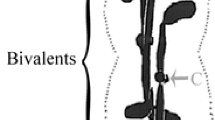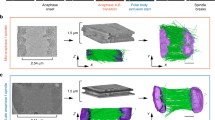Abstract.
Univalents, that is, chromosomes lacking an attached partner at the first meiotic division, show extremely faulty transmission. Most segregational errors stem from amphitelic (mitotic-like) orientation at metaphase I followed by anaphase I lagging. Our studies in living grasshopper spermatocytes show that amphitelic orientation may provoke spindle collapse: spindle elongation and cytokinesis are impaired and an unreduced restitution nucleus is formed. This does not prevent meiotic progression and eventually leads to the production of diploid gametes. The morphology and characteristics of spindle collapse in our material, as revealed by in vivo observation and tubulin immunostaining, indicate an active role of the chromosomes in the whole process.
Similar content being viewed by others
Author information
Authors and Affiliations
Additional information
In revised form: 4 April 2001
Electronic Publication
Rights and permissions
About this article
Cite this article
Rebollo, .E., Arana, .P. Active role of lagging chromosomes in spindle collapse as revealed by live phase contrast and tubulin immunostaining in grasshopper spermatocytes. Chromosoma 110, 292–304 (2001). https://doi.org/10.1007/s004120100147
Received:
Accepted:
Issue Date:
DOI: https://doi.org/10.1007/s004120100147




